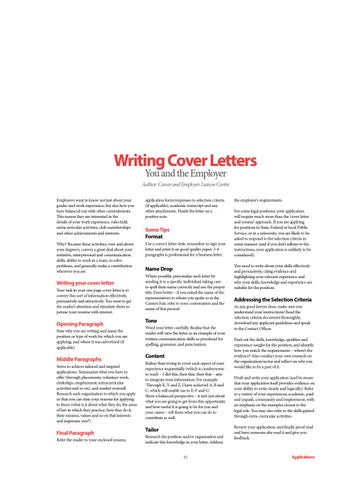Writing Cover Letters You and the Employer
Author: Career and Employer Liaison Centre Employers want to know not just about your grades and work experience, but also how you have balanced uni with other commitments. This means they are interested in the details of your work experience, roles held, extracurricular activities, club memberships and other achievements and interests.
application form/responses to selection criteria (if applicable), academic transcript and any other attachments. Finish the letter on a positive note.
Why? Because these activities, over and above your degree/s, convey a great deal about your initiative, interpersonal and communication skills, ability to work in a team, to solve problems, and generally make a contribution wherever you are.
Use a correct letter style, remember to sign your letter and print it on good quality paper. 3-4 paragraphs is professional for a business letter.
Writing your cover letter Your task in your one page cover letter is to convey this sort of information effectively, persuasively and attractively. You want to get the reader’s attention and stimulate them to peruse your resume with interest.
Opening Paragraph State why you are writing and name the position or type of work for which you are applying, and where it was advertised (if applicable)
Middle Paragraphs Strive to achieve tailored and targeted applications. Summarize what you have to offer (through placements, volunteer work, clerkships, employment, extracurricular activities and so on), and market yourself. Research each organization to which you apply so that you can state your reasons for applying to them (what is it about what they do, the areas of law in which they practice, how they do it, their mission, values and so on that interests and impresses you?)
Final Paragraph Refer the reader to your enclosed resume,
Some Tips Format
Name Drop Where possible, personalise each letter by sending it to a specific individual, taking care to spell their name correctly and use the proper title. Even better – if you noted the name of the representatives to whom you spoke to at the Careers Fair, refer to your conversation and the name of this person!
Tone Word your letter carefully. Realise that the reader will view the letter as an example of your written communication skills so proofread for spelling, grammar, and punctuation.
Content Rather than trying to cover each aspect of your experience sequentially (which is cumbersome to read) – I did this, then that, then that – aim to integrate your information. For example: ‘Through X, Y and Z, I have achieved A, B and C, which will enable me to E, F and G.’ Show a balanced perspective – it isn’t just about what you are going to get from this opportunity and how useful it is going to be for you and your career – tell them what you can do to contribute as well.
Tailor Research the position and/or organisation and indicate this knowledge in your letter. Address 81
the employer’s requirements. For some legal positions, your application will require much more than the ‘cover letter and resume’ approach. If you are applying for positions in State, Federal or local Public Service, or in a university, you are likely to be asked to respond to the selection criteria in some manner (and if you don’t adhere to the instructions, your application is unlikely to be considered). You need to write about your skills effectively and persuasively, citing evidence and highlighting your relevant experience and why your skills, knowledge and experience are suitable for the position.
Addressing the Selection Criteria As any good lawyer does, make sure you understand your instructions! Read the selection criteria document thoroughly, download any applicant guidelines and speak to the Contact Officer. Find out the skills, knowledge, qualities and experience sought for the position, and identify how you match the requirements – where’s the evidence? Also conduct your own research on the organisation/sector and reflect on why you would like to be a part of it. Draft and write your application (and be aware that your application itself provides evidence on your ability to write clearly and logically). Refer to a variety of your experiences; academic, paid and unpaid, community and employment, with an emphasis on the examples closest to the legal role. You may also refer to the skills gained through extra-curricular activities. Review your application, and finally proof read and have someone else read it and give you feedback.
Applications
